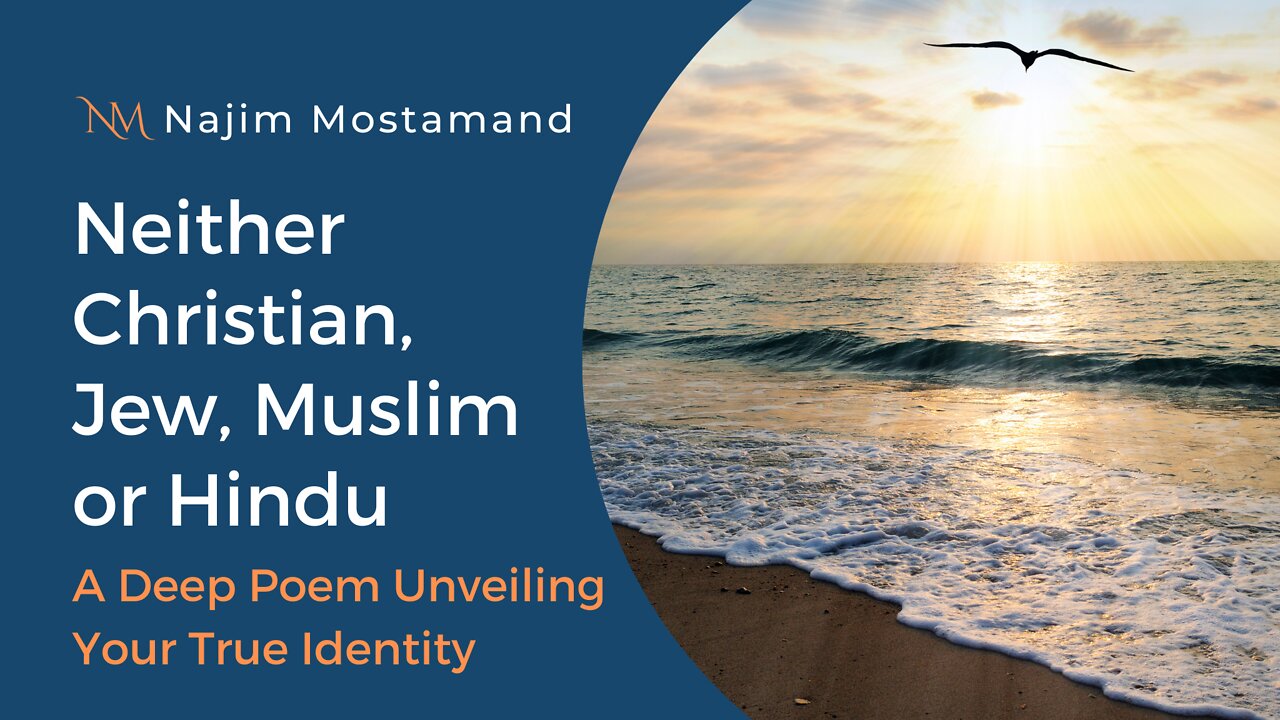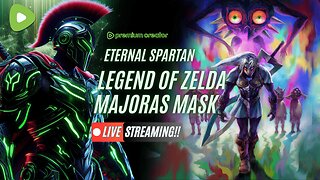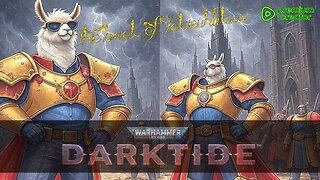Premium Only Content

Neither Christian, Jew, Muslim or Hindu – Rumi Poem
No religion, nationality, or ideology will ever define us, Rumi says, because we simply belong to the Beloved. That is the only identifier that matters.
Listen to this poem for yourself and see why you should be neither Christian, Jew, Muslim or Hindu.
#rumi #rumipoetry #rumipoem
---
If you are looking for more inspiration, spiritual poetry, and ancient wisdom for awakening, please subscribe to my YouTube channel and follow me on social:
https://www.youtube.com/c/NajimMostamand
Website: https://najimmostamand.com/
Instagram: https://www.instagram.com/najimmostamand/
Facebook: https://www.facebook.com/najimmostamand1/
Patreon Donation Page: https://www.patreon.com/najimmostamand
Medium: https://medium.com/@namostamand
© 2022 Najim Mostamand
---
What can I do my friends, if I do not know?
I am neither Christian nor Jew, neither Muslim nor Hindu.
What can I do? What can I do?
Not of the East, nor of the West,
Not of the land, nor of the sea,
Not of nature's essence, nor of circling heavens.
What could I be?
Not of earth, nor of water,
Nor of fire, nor of air,
Not of the land, nor of the sky,
Not of being, nor of existence.
My place is the placeless.
My trace is the traceless.
I have no body or soul,
Cause I belong to my Beloved
Entire whole.
~ Maulana Jalaluddin Rumi
---
Jalāl ad-Dīn Mohammad Rumi (1207 — 1273), also known as Jalāl ad-Dīn Mohammad Balkhī, Mowlānā, or more simply and popularly as Rumi, was a 13th-century Persian poet, scholar, philosopher, and Sufi mystic.
Rumi's parents were originally from Balkh in modern-day Afghanistan. His father, Baha ud-Din Walad, a well-regarded theologian, jurist and mystic, was an important spiritual influence on Rumi's life, as well as previous Sufi mystics and poets, like Sanai and Attar.
When Rumi was a young child, the Mongols, led by Genghis Khan, invaded Central Asia, forcing Rumi's family to escape westwards via caravan to avoid persecution and death. On his travels, it is believed that Rumi encountered Attar in Nishapur, during which the elder mystic gave the teenager his Asrar Nama (Farsi: "The Book of Secrets"), which had a significant impact on Rumi's life outlook, philosophy, and poetry.
When Rumi turned 25, his father passed away and he felt a deep void in his spirituality. He followed his father's footsteps and took over the role of the Islamic molvi, or Muslim doctor of law. For roughly nine years, Rumi practiced Sufism under one of Baha ud-Din's disciples, Burhan ud-Din, who helped prepare him for an even greater spiritual encounter down the road. But it wasn't until November 15, 1244, that Rumi's life turned upside down.
On this day, Rumi met the wandering dervish and mystic Shams-e Tabrizi in Damascus, who transformed Rumi from an accomplished teacher, scholar and jurist to a humble ascetic. Shams (Farsi: the "Sun") saw Rumi's pride in having immense religious knowledge and fame, and threw Rumi's books on the ground, signifying that he knew nothing.
Under Shams' spiritual guidance, Rumi became introduced to divine love, music, poetry, and dance through the mystic Sufi practice of Sama. The two formed an inseparable bond, which is believed to have isolated Rumi from his students and family members, some of whom are said to have grown jealous of Rumi's companion. Two years after they met, Shams abruptly left Konya. When Shams returned, however, he disappeared shortly after, with several sources suggesting that he was murdered at the order of Rumi's son Ala-eddin.
His death sent Rumi reeling into depression, and to express and cope with his bereavement, Rumi began writing hundreds of lyric poems, which altogether formed The Divan of Shams-e Tabrizi (or Book of Shams of Tabriz). He continued to write many poems, until one of his companions, Husaam al-Din Chalabi, inspired him to produce an even greater masterpiece.
One day Husaam explained to Rumi how great it would be if Rumi composed an epic mystic poem, similar to Sanai's "The Walled Garden of Truth" or Attar's "The Conference of the Birds," which Rumi's followers regularly read. Rumi is said to have smiled, took out a piece of paper, and wrote these famous two lines:
بشنو از نی چون حکایت می کند
از جدایی ها شکایت می کند
Listen to the ney, how it tells this sad tale,
Lamenting separations (from the One beyond scale)
Husaam begged Rumi to write more, and the mystic dedicated the final12 years of his life to composing the rest of the epic poem, which eventually made up his greatest work: the Masnavi-e Ma'navi (or "The Spiritual Couplets"). In December of 1273, he fell ill and passed away days later on December 17. Many refer to the day of his passing as Shab-e Aroos (or "Wedding Night") to signify that the mystic has finally united with his Beloved.
-
 25:55
25:55
Najim Mostamand
9 months agoDealing with Unawakened People on Your Spiritual Journey
22 -
 30:09
30:09
Afshin Rattansi's Going Underground
1 day agoCurtis Yarvin: ‘Trump 47 is 10x More Powerful than Trump 45’ & the TOXIC US-Israel Relationship
17.8K28 -
 LIVE
LIVE
Drew Hernandez
8 hours agoTRUMP HINTS DEMS COULD HAVE PLANTED FAKE EVIDENCE & MANIPULATED EPSTEIN FILES
1,013 watching -
 LIVE
LIVE
Eternal_Spartan
11 hours agoThe Legend of Zelda: Majoras Mask Ep. 5 | USMC Vet | Come Join the Best Chat on Rumble!!!!
87 watching -
 3:44:24
3:44:24
Barry Cunningham
5 hours agoBREAKING NEWS: LIVE COVERAGE OF NEW YORK POLICE OFFICERS UNDER SIEGE!
75.7K61 -
 2:51:25
2:51:25
The Pascal Show
3 hours ago $0.34 earnedBREAKING! Active Shooter In Midtown Manhattan NYC Multiple People Shot!
11.7K -
 10:25
10:25
MattMorseTV
8 hours ago $2.05 earnedVance just DROPPED a NUKE.
27.1K35 -
 LIVE
LIVE
Jokeuhl Gaming and Chat
6 hours agoDARKTIDE - Warhammer 40k w/ Nubes and AoA
137 watching -
 LIVE
LIVE
Shoriantrax
2 hours agoLIVE: Hardcore Chaos in Tarkov – Loot, Die, Repeat!
13 watching -
 LIVE
LIVE
John_Goetz
3 hours agoJohn Gets Gaming - Medal of Honor Vanguard Part 2
11 watching